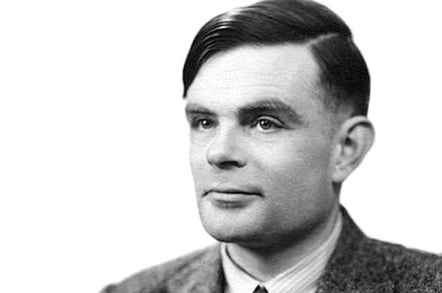Cryptography is the Bombe: Britain’s Enigma-cracker on display in new home
Replica war-winner now in Bletchley Park’s historic Block H

Legendary codebreaker Alan Turing was one of the people who worked on the Bombe during the Second World War
The UK National Museum of Computing will open its new Bombe gallery this weekend at Bletchley Park in Milton Keynes after a successful crowdfunding campaign to put the WWII code-breaking machines on display.
“We even hope to have a Colossus operator veteran present so that they can exchange notes – something they could never do during the war!” said the museum in a statement.
The Bombe was developed as part of Britain’s efforts to break Nazi Germany’s military ciphers and intercept war plans. Cryptologists used the electro-mechanical machines to speed up their deciphering of Germany’s Enigma messages.
“Visitors will be able to see the world-famous Bombe reconstruction in action and learn how it broke Enigma messages – and compare it to the acclaimed working Colossus reconstruction and discover how it was the key to breaking Lorenz messages,” the museum added.
Britain’s Bombes were derived from original design work carried out by Polish cryptanalysts who took their expertise to the UK when Germany invaded Poland in 1939. Legendary codebreakers Alan Turing and Gordon Welchman used the Poles’ principles to design a very different beast capable of keeping up with advances in German cryptography, as the Crypto Museum explains in some detail.
The Bombe at Bletchley today is a replica, the originals having been destroyed as part of the post-war effort to keep Bletchley Park’s codebreaking a state secret. The replica will, however, be housed in Block H at TNMOC, the building which housed the original machines.
The replica was moved to its current location after the museum rattled the bucket, receiving £60,000 in public donations to help preserve the historic recreation of a vital part of Britain’s codebreaking heritage.
Saturday, 23 June, the day that the Bombe gallery opens to the public, is also Alan Turing’s 106th birthday. Wartime re-enactors “will bring the history alive and give a sense of the wartime atmosphere” on the day, while families are encouraged to enjoy a cream tea and some retro computer games. ®
Sponsored: Minds Mastering Machines – Call for papers now open
READ MORE HERE
